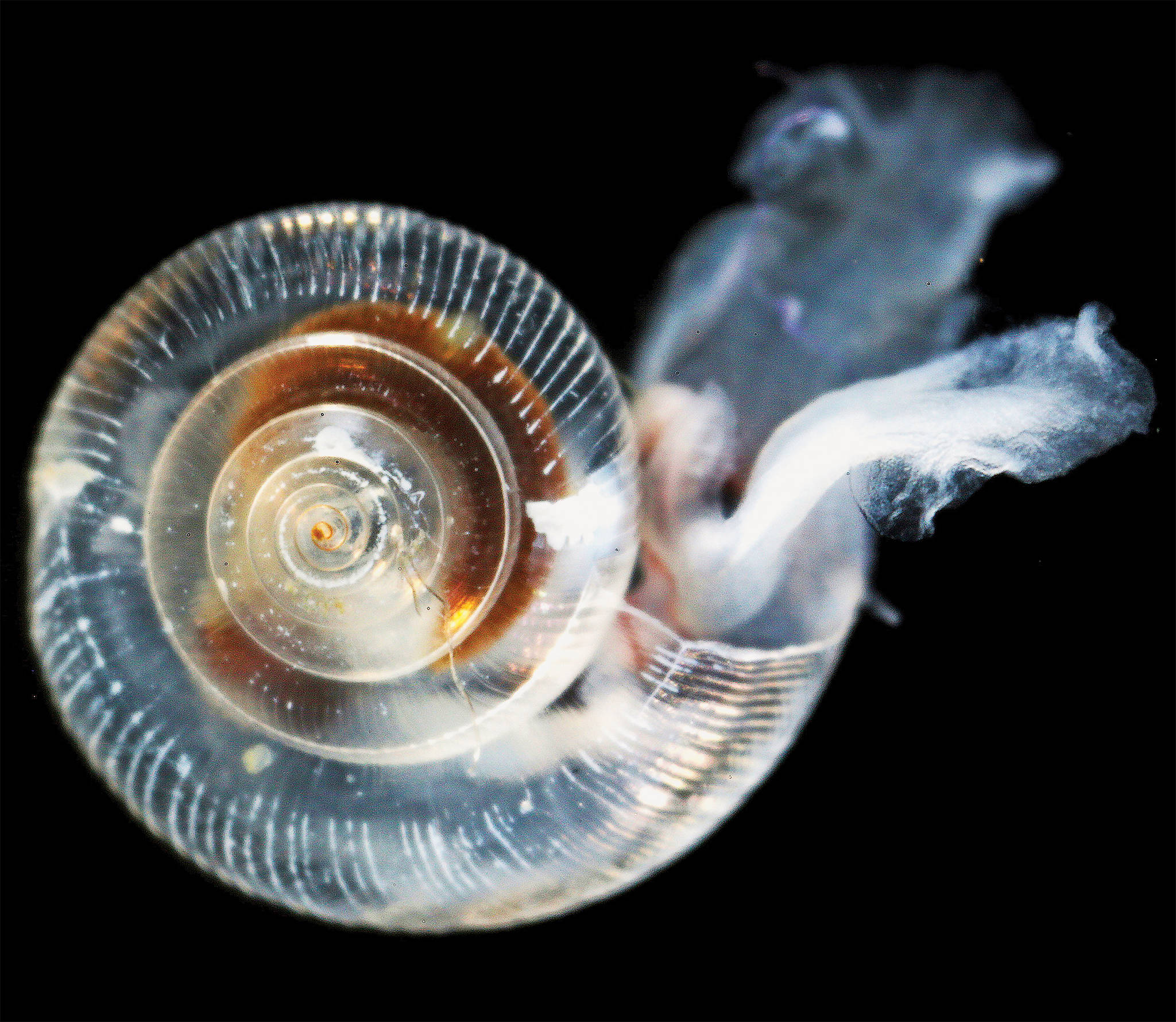Pteropods may look otherworldly, but they are a real and threatened species of minuscule marine snail whose appearance in Homer author Nancy Lord’s new novel “pH” makes the book not science fiction, but an example of science in fiction.
“pH” is the first novel for Lord, a mostly literary nonfiction writer whose five previous books have looked at endangered Cook Inlet beluga whales, personal recollections of setnet fishing, and northern experiences of climate change. “pH” gives its first factual data point on page three: “Alaska has more coastline than the rest of the United States put together.” The thought that immediately follows in the mind of “pH”’s hero, marine biologist Ray Berringer, is that it only makes sense for Alaskans to lead the study of ocean acidification and how it affects the food chains on which many coastal lives — and the economic lives of many Alaskans — depend.
The particular effect that concerns Berringer and the readers of “pH” is damage to the shells of pteropods, an animal between 1/8 inch and 1/2 inch which makes up about 60 percent of the diet of ocean-going pink salmon. As carbon dioxide rises in the atmosphere from the burning of hydrocarbon fuel, about a third of it is absorbed into the ocean, leading to reactions that deplete the ocean’s calcium carbonate, the mineral from which many marine creatures build shells. A healthy pteropod’s shell is smooth and glassy, but the shell of the real pteropod on the cover of “pH” has chalky ridges and pits caused by its calcium-deficient environment.
Today’s oceans are 30 percent more acidic than they were 100 years ago, possibly threatening the species and everything above it in the food chain. In 2014 researchers from the National Oceanic and Atmospheric Administration projected that shell damage could affect 70 percent of pteropods on the U.S west coast by 2050, according to the Seattle Times.
Lord’s pteropod researcher Berringer, like the NOAA researchers, also photographs his tiny subjects, hoping to make them the poster animal for ocean acidification — what Lord calls “the other CO2 problem” — as polar bears have become for climate change.
“I share that sentiment with him,” Lord said. “I’d like people to understand the whole ecosystem. It sort of bothers me when people only care about the charismatic megafauna like polar bears and don’t realize that it all depends on a very basic level… Like they care about salmon, but not what salmon are eating.”
In a Dec. 7 presentation at Kenai Peninsula College, Lord said she wrote“pH” — published in September after being completed several years ago, with the original title of “The Pteropod Gang” — because after dedicating much of her nonfiction to the environment and climate change, she “realized that readers were suffering from what we call ‘bad news fatigue.’” Fiction, she thought, could engage readers with the issue in a different way.
In “pH,” the real-world stakes of pteropod diminishment also put on the line the career of Ray Berringer and the work of his graduate students, as well as that of an environmentally concerned artist and the scientfic integrity of an Alaskan university. The plot, Lord said, is built around “conflict, corruption, and a lead character who frequently gets himself into trouble.”
Lead by its science, “pH” is also to some extent a political novel — an intersection Lord believes will grow more important to fiction.
“We’ve seen recently, and especially since our last national election, that we’re living in an age that disrespects science and tries to undercut it,” Lord said. “… I’m just sort of stunned that we’re living in a time where we actually need to defend science. I’ve always took it as a given that science was a good thing. That’s why writers and artists of all kinds, and educators, and citizens as a whole, need to do what we can to bring science into our work and our everyday conversations with others.”
Since beginning “pH,” Lord said she’d become interested in the recent trend of fiction centering on science and scientists — not science fiction, because it’s often set in a world recognizably our own, but “science in fiction.”
Lord said she’s planning to write more scientifically-orientated fiction in the near future. She’s working now on a collection of short stories that she said will be “pretty environmental, and a lot of them will be climate-related.” She’ll be leading a session about the meeting of science and fiction at the 2018 Kachemak Bay Writer’s Conference in Homer, sitting on the conference faculty alongside two other writers whom she said have written science-focused fiction: Jean Hegland and keynote speaker Anthony Doerr. The workshop will also feature a session about science-inspired poetry by Erin Hollowell.
“Science really is the subject of our day, whether it’s climate change, genetic manipulation, space exploration, pandemics, environmental destruction — it’s all science,” Lord said. “It’s almost hard for me to think of things that aren’t science in some way. As writers, I feel like we should be telling these stories and defending science and scientists — because when we get down to it, really, our lives depend on this.”
Reach Ben Boettger at ben.boettger@peninsulaclarion.com.

